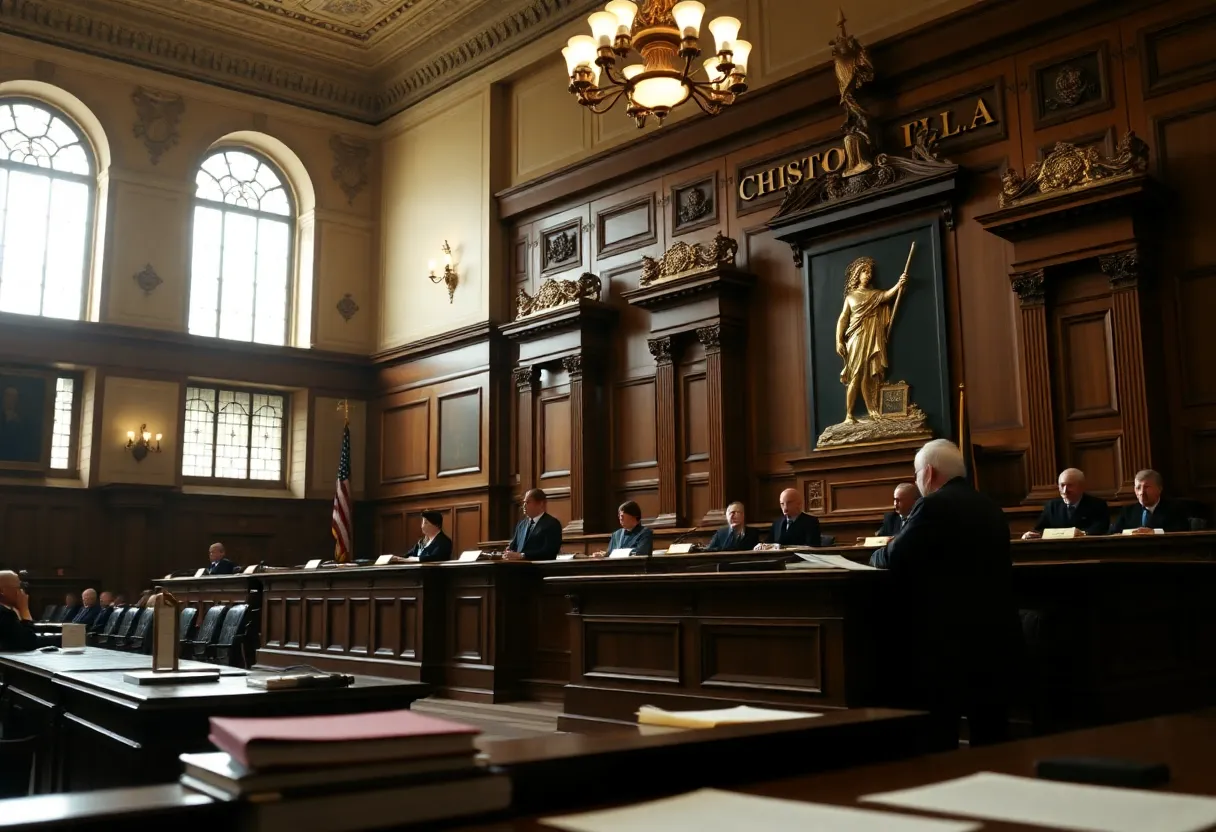News Summary
The New York State Court of Claims, established to allow individuals to sue the state, plays a vital role in civil rights and accountability. Handling around 1,500 lawsuits annually, it addresses various cases, including slip-and-fall accidents and wrongful convictions. With a history rooted in the shift from sovereign immunity, this court ensures that the state can be held accountable, especially after key developments like the Attica Prison uprising. Moving forward, it will continue to adapt within New York’s legal landscape.
Albany, New York – The New York State Court of Claims, established in 1949, serves as a crucial mechanism allowing individuals to sue the state for civil claims, a shift from the historical doctrine of sovereign immunity. This doctrine, originating from English tradition, held that monarchs could do no wrong and thus could not be sued. This principle carried over to colonial America and persisted in New York, limiting citizens’ ability to seek redress against state actions without legislative consent.
The Court of Claims was created through a constitutional amendment, enabling civil suits against the state and its entities. Today, the court addresses a wide array of cases, including those involving public universities, medical centers, and state-owned properties. Judges in the court, appointed by the governor, decide cases without juries, which are common in typical civil litigation.
Each year, the Court of Claims manages a high caseload of approximately 1,500 lawsuits, facilitated by a staff of 27 judges located in various jurisdictions across New York State. The court commonly handles claims related to slip-and-fall accidents, highway incidents, injuries sustained at state recreational facilities, wrongful convictions, and medical malpractice cases arising from state hospital care.
One notable progression in the court’s function came in the aftermath of the Attica Prison uprising in 1971. Incarcerated individuals were subsequently granted the right to sue the state for various grievances, thereby holding the state accountable for the treatment of inmates concerning their living conditions and safety. Although inmates can file for “wrongful confinement,” the burden of proof for such claims is intentionally stringent, requiring them to demonstrate egregious misconduct or extreme negligence on the state’s part, with a standard of “clear and convincing evidence.”
The function of the Court of Claims extends to a variety of sectors, including agriculture. Farmers can seek relief for property appropriations resulting from state infrastructure projects. Through its adjudications, the court has awarded hundreds of millions of dollars to individuals wrongfully imprisoned, thereby this institution plays an essential role in securing government accountability within New York.
Historically, prior to the establishment of the Court of Claims, individuals found it virtually impossible to sue the state for grievances. Some exceptions emerged, particularly during developments related to the Erie Canal, but those were limited and did not provide comprehensive legal recourse. The creation of the court significantly transformed the landscape of civil rights in the state, emphasizing that even the state could be held liable for its actions or negligence.
Judges in the Court of Claims often act independently, frequently ruling against the state despite their appointments by state officials. This independence is vital in ensuring that justice is upheld and that state actions are scrutinized fairly. The court’s role remains indispensable as it continues to evolve within the legal framework of New York State, addressing contemporary issues and ensuring accountability for state conduct.
Looking ahead, future columns will delve into the workings of local judicial systems, focusing on town, city, county, district, and housing courts throughout New York State, further illuminating the intricate legal landscape that governs residents’ lives. The Court of Claims stands as a testament to the progress made in civil rights and accountability mechanisms within government structures.
Deeper Dive: News & Info About This Topic
HERE Resources
New York Attorney General Sues Zelle Over Fraud Claims
Allstate Sues A to Z Supply Services Over Insurance Fraud
GEICO Sues Advanced Supplies for $620,000 Fraud Allegations
Understanding New York’s Court of Claims System
Trump’s Executive Order Challenges Cashless Bail Policies
Trump’s Golf Resorts in Scotland Face Financial Struggles
New York State Faces Potential Violation of Climate Law
Corruption Allegations Rock Nassau County DA Race
Lawsuit Filed Against New York Cannabis Regulators
Legal Action Initiated Against New York Cannabis Regulators
Additional Resources
- City & State New York: Responsible 100 Awards
- Long Island Business News: Corporate Citizenship Awards
- Newsweek: Elon Musk to Give Global Citizenship Award
- The Guardian: Elon Musk to Present Global Citizen Award
- Altice USA: Optimum Named Recipient of Corporate Citizenship Award
- Wikipedia: Court of Claims
- Google Search: New York State Court of Claims
- Google Scholar: Court of Claims
- Encyclopedia Britannica: Court of Claims
- Google News: New York Legal System

Author: STAFF HERE NEW YORK WRITER
The NEW YORK STAFF WRITER represents the experienced team at HERENewYork.com, your go-to source for actionable local news and information in New York, the five boroughs, and beyond. Specializing in "news you can use," we cover essential topics like product reviews for personal and business needs, local business directories, politics, real estate trends, neighborhood insights, and state news affecting the area—with deep expertise drawn from years of dedicated reporting and strong community input, including local press releases and business updates. We deliver top reporting on high-value events such as New York Fashion Week, Macy's Thanksgiving Day Parade, and Tribeca Film Festival. Our coverage extends to key organizations like the Greater New York Chamber of Commerce and United Way of New York, plus leading businesses in finance and media that power the local economy such as JPMorgan Chase, Goldman Sachs, and Bloomberg. As part of the broader HERE network, including HEREBuffalo.com, we provide comprehensive, credible insights into New York's dynamic landscape.





